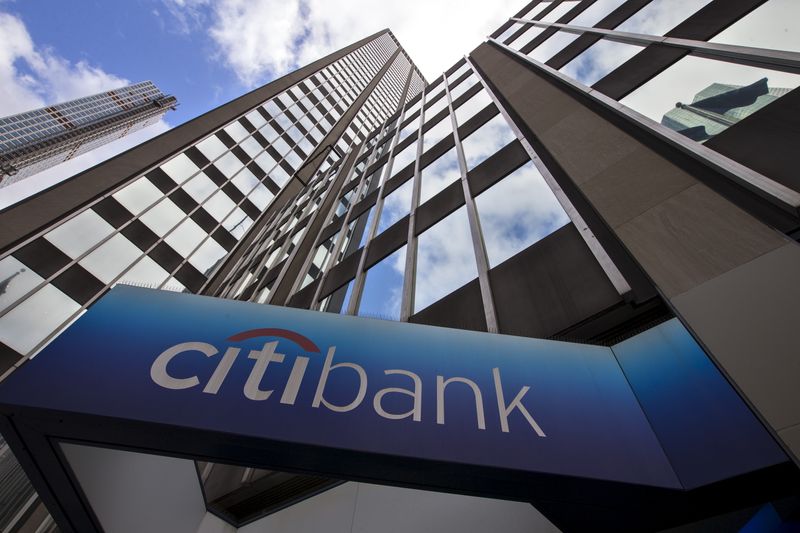By Ambar Warrick, Imani Moise and Noor Zainab Hussain
(Reuters) - Citigroup Inc (NYSE:C) reported quarterly profit that beat market expectations on Friday, but a downbeat revenue and expense outlook showed it will take more than a year for the emerging economic recovery to trickle through to the bank's bottom line.
Bets on an economic recovery hinged on coronavirus vaccine roll outs and massive fiscal stimulus allowed Citi to release $1.5 billion from its reserves that it had previously set aside for sour loans, boosting results.
Finance chief Mark Mason warned that the revenue the bank earns from lending activities could fall more than 4% this year as the bank contends with the rock-bottom interest rates monetary authorities are holding in place to prop up the economy.
Citi’s revenue slid 10% in the last quarter of 2020, driven by declines in its consumer bank as customers borrowed less and paid down more debt. Fees in the North American branded cards business, once the growth engine of the consumer bank, tumbled 13%.
Trading remained a bright spot defying concerns that the breakneck growth in trading revenue seen throughout 2020 was unsustainable.
Equities fees jumped 57% from last year and fixed-income fees grew 7%, but the bump was not enough to offset interest-related revenue declines during the quarter.
Citi shares fell 5.4% to $65.32 as the bank reported a 7% decline in profit even as its peers JPMorgan (NYSE:JPM) and Wells Fargo (NYSE:WFC) & Co posted growth in the fourth quarter.
Expenses rose 2% as the bank spent more to address its risk and controls after being sanctioned by regulators last year for failing to address years long deficiencies.
Citi's finance head Mark Mason also said the bank's expenses would rise again in 2021 in the range of 2% to 3% this year, further pressuring its operating margins.
Incoming CEO Jane Fraser, who will officially take over next month, told analysts on a call that she was "determined" to address the deficiencies in its risk and control environment that have been raised by regulators and encouraging analysts skeptical that things would be different under her tenure to hold her accountable.
In all, the bank profit of $4.63 billion, or $2.08 a share, down from $5 billion, or $2.15 a share, a year earlier. Analysts on average had expected profit of $1.34 per share, according to Refinitiv data
Total loans fell 3% to $676 billion, while deposits rose 20% to $1.3 trillion as customers, faced with economic uncertainties, borrowed less and saved more.
Outgoing CEO Michael Corbat said the bank intended to resume share buybacks in the first quarter, after receiving a green light from regulators last month.
It has a capacity to buyback shares worth $1.8 billion in the first quarter, Mason said.
